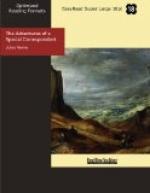The major mentioned certain animals which constitute a somewhat varied fauna on the heights of the Pamir. It is even necessary to keep an eye on the platforms of the cars in case a stray panther or bear might seek a ride without any right to travel either first or second class. During the day our companions were on the lookout from both ends of the cars. What shouts arose when plantigrades or felines capered along the line with intentions that certainly seemed suspicious! A few revolver shots were discharged, without much necessity perhaps, but they amused as well as reassured the travelers. In the afternoon we were witnesses of a magnificent shot, which killed instantly an enormous panther just as he was landing on the side step of the third carriage.
“It is thine, Marguerite!” exclaimed Caterna. And could he have better expressed his admiration than in appropriating the celebrated reply of Buridan to the Dauphine’s wife—and not the queen of France, as is wrongly stated in the famous drama of the Tour de Nesle?
It was our superb Mongol to whom we were indebted for this marksman’s masterpiece.
“What a hand and what an eye!” said I to the major, who continued to look on Faruskiar with suspicion.
Among the other animals of the Pamirian fauna appeared wolves and foxes, and flocks of those large wild sheep with gnarled and gracefully curved horns, which are known to the natives as arkars. High in the sky flew the vultures, bearded and unbearded, and amid the clouds of white vapor we left behind us were many crows and pigeons and turtledoves and wagtails.
The day passed without adventure. At six o’clock in the evening we crossed the frontier, after a run of nearly two thousand three hundred kilometres, accomplished in four days since leaving Uzun Ada. Two hundred and fifty kilometres beyond we shall be at Kachgar. Although we are now in Chinese Turkestan, it will not be till we reach that town that we shall have our first experience of Chinese administration.
Dinner over about nine o’clock, we stretched ourselves on our beds, in the hope, or rather the conviction, that the night will be as calm as the preceding one.
It was not to be so.
At first the train was running down the slopes of the Pamir at great speed. Then it resumed its normal rate along the level.
It was about one in the morning when I was suddenly awakened.
At the same time Major Noltitz and most of our companions jumped up.
There were loud shouts in the rear of the train.
What had happened?
Anxiety seized upon the travelers—that confused, unreasonable anxiety caused by the slightest incident on a railroad.
“What is the matter? What is the matter?”
These words were uttered in alarm from all sides and in different languages.
My first thought was that we were attacked. I thought of the famous Ki-Tsang, the Mongol pirate, whose help I had so imprudently called upon—for my chronicle.




